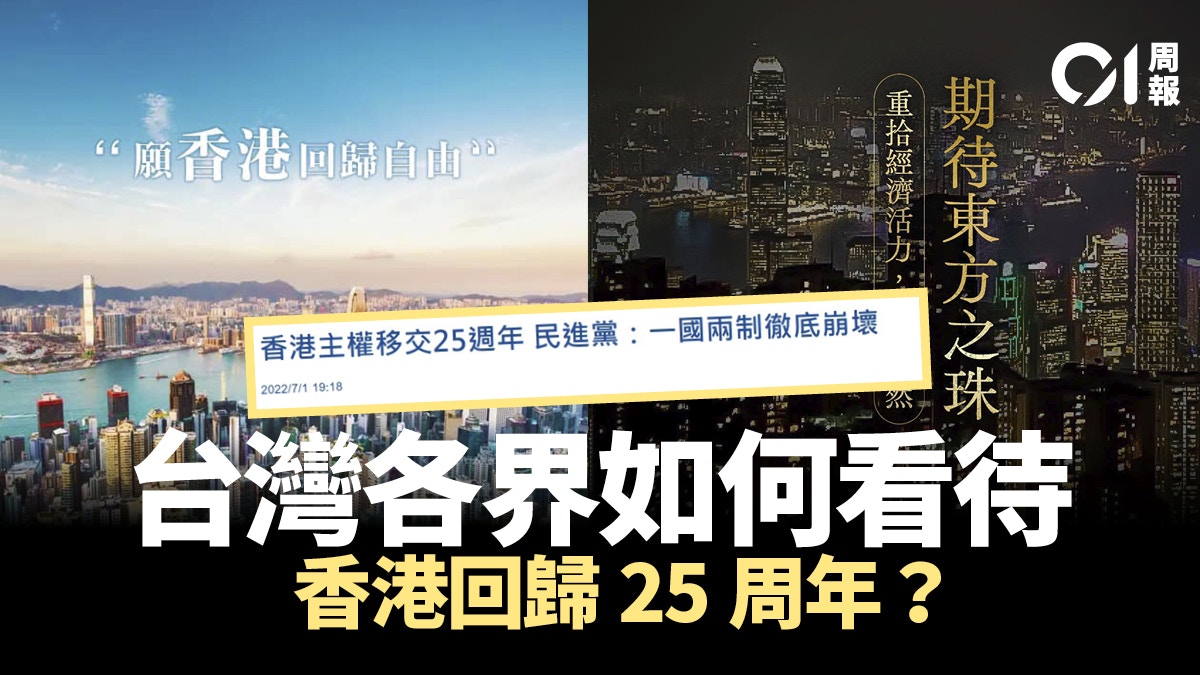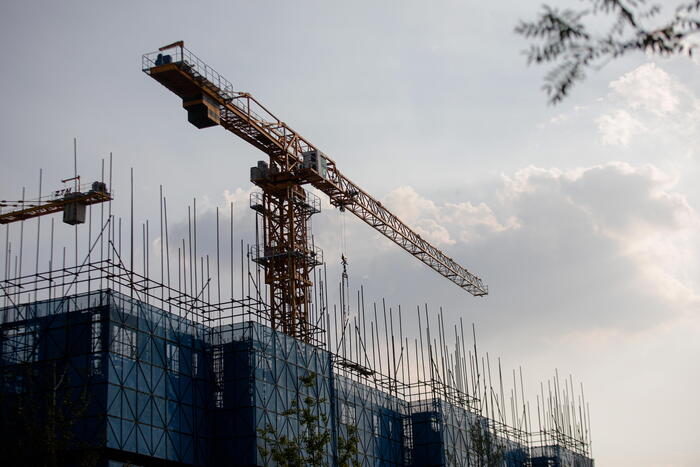On the 25th anniversary of Hong Kong's return to China, Chinese leader Xi Jinping attended the celebration ceremony, hoping that "one country, two systems" must be adhered to for a long time.
In Taiwan, the various political turmoil in Hong Kong in the past 25 years has been seen in the eyes. Regardless of the blue or green, they all hold negative and pessimistic sentiments towards "one country, two systems", and they also project their own worries and resistance in the changing situation in the Taiwan Strait, forming the current state of affairs. The majority view of Taiwanese society towards Hong Kong.
The fear of "Hong Kong today, Taiwan tomorrow" is still fermenting in Taiwan, which is dominated by party politics.
Twenty-five years ago, when Hong Kong officially returned to China, the editorials of several mainstream media in Taiwan, such as "United Daily News" and "Business Times", basically expressed the same festive feelings, and also placed their hopes on the practice of "One Country, Two Systems" in Hong Kong. expect.
After 25 years of ups and downs in cross-strait relations and Hong Kong-Taiwan relations, as well as the stumbling of Hong Kong's internal political operations, Taiwan's media and public opinion are now in a different state of mind.
For example, "United Daily News" specially made a full-page special topic "Hong Kong, the next 25 years", focusing on the population exodus from Hong Kong after the introduction of the principle of "patriots ruling Hong Kong".
"China Times" questioned that "the return of people's hearts" will be a major challenge.
TVBS also made a report, pointing out that the July 1st received little attention, and that people in Taiwan and Hong Kong thought this day was "meaningless" and just "one more day off".
Not to mention the state media Central News Agency, almost all the topics on the 25th anniversary of Hong Kong’s return to the motherland focus on the austerity of Hong Kong’s political situation.
On the 25th anniversary of Hong Kong's return, Chu Lilun, chairman of the Kuomintang, issued a document expressing his solidarity with Hong Kong's democracy and freedom. "May one day, people will not commemorate Hong Kong's return to any regime, but celebrate Hong Kong's return to freedom." (Chu Lilun Facebook)
As for political parties, the Kuomintang issued a strongly worded statement titled "May Hong Kong return to freedom", "May one day, people will not commemorate the return of Hong Kong to any regime, but celebrate the return of Hong Kong to freedom." This is almost in line with the statement of US Secretary of State Antony Blinken - "We stand in solidarity with the people of Hong Kong and stand in solidarity with their call for the restoration of their promised freedoms".
From the way the Kuomintang expressed its position, it can be seen that the views of Taiwanese political parties on the Hong Kong issue basically follow the United States.
When Taiwan interprets the Hong Kong issue, there is a kind of "sympathy" based on an "anti-China" mentality, and there is a "desolation and loneliness" that is watching fire from the other side.
Such a contradictory psychology comes from the rise of China and the game between China and the United States, which has caused the situation in the Taiwan Strait to heat up. The resistance to reunification and the disgust for "one country, two systems" have stood at the forefront of public opinion under the operation of political figures "anti-China protection of Taiwan". The sentiment is projected onto the political changes since Hong Kong's return, reflecting the collective anxiety of Taiwanese society over the pressure of reunification.
Although there are many differences in nature between Taiwan and Hong Kong, from the perspective of historical context and geography, they still share similarities in fate.
The development of Taiwan and Hong Kong in the post-war period actually took the train of the Cold War, and was lingered by the dividends of the Cold War. In particular, Taiwan assumed the functions of a political and military base and was familiar with Western discourse, but it was always separated from the world by a sea. On the other side, there is a barrier that is difficult to push down.
Therefore, in today's turbulent world order between the old and the new, the accustomed and familiar discourse of the Cold War will still be chosen to deal with the new situation that cannot be adjusted.
Taiwan is caught in a cognitive paradox. It not only wants to show its strong "independence" status to mainland China, and does not accept "one country, two systems" as being implicated in Taiwan, but also follows the pattern of past understanding. "Paper tiger", jokingly thinks that "unification" or "wutong" is just Lu Fang's "quick talk".
In fact, Hong Kong's experience itself can be used as a mirror for Taiwan to re-understand the CCP.
For Taiwan, the changes in Hong Kong along the way are by no means "a matter of our own."
The CCP, which has gone through the Cultural Revolution and has just stepped into the reform and opening up "crossing the river by feeling the stones", cannot be shaken on the issue of Hong Kong sovereignty, not to mention its growing political and economic influence, putting the solution of the Taiwan issue into the process of national rejuvenation. of today.
The "Two Systems Taiwan Plan" proposed by Xi Jinping in 2019 is an indicator. The Taiwan issue has been placed at the core of high-level contacts and dialogues between China and the United States. It is necessary to reiterate Beijing's bottom line and red line on the Taiwan issue regardless of tit-for-tat. , for Taiwan independence, it also took a "precise strike" and separated it from the people's districts of Taiwan, from "giving profits" to "melting the land" and then laying out the governance layout of "post-unification" step by step. Beijing has both strategic patience and strategic determination to resolve the Taiwan issue, as well as a unified determination and will that should not be underestimated.
So whether Taiwan's "army reunification", which is both resistant and worried, will break out depends on how much the United States plays the "Taiwan card" and how much the Taiwanese rulers echo the "pro-US" echoes.
Once the red line of "Taiwan independence" is crossed, the inevitable final showdown will also be placed in front of the Taiwanese people.
If the situation deteriorates to this point, Hong Kong's previous political turmoil has cost society a great deal of turmoil, "demonstrating" how the United States "does not pay lip service", and Taiwan should take a warning and show true "subjectivity" and "" autonomy", preventing oneself from becoming cannon fodder sacrificed by the United States.
On the 25th anniversary of Hong Kong's return to the motherland, Chinese leader Xi Jinping attended the celebration ceremony, emphasizing that "one country, two systems" must be adhered to for a long time.
(Associated Press)
After 25 years of return to Hong Kong, people from all walks of life are asking how to "open a new chapter" and "seek a new situation" in the next step; Taiwan is desperately trying to learn from the situation in Hong Kong today, to absorb all kinds of negative elements such as fear, helplessness, worry, etc. , as a shield to escape the pressure of unification.
However, the order and structure that Taiwan relied on in the past is undergoing earth-shaking changes. Hong Kong stepped into this irreversible change earlier, and thus sought and explored the road to rebuilding a collective consensus after the great tear.
The situation of the whole world "rising in the east and descending in the west" is particularly evident after the Russian-Ukrainian war. Although the West recruits troops and regroups, the hollowing out of their own internal problems is inevitable. The turmoil in Hong Kong in the past and the tension in the frontiers of the world are all undermined. It hints at the arrival of a "new world".
If Taiwan is still stuck in the cognitive framework of 25 years ago, or even the barrier thinking of the Cold War era, in addition to the ideological call and standing in line, it can also find a foothold for itself beyond the collision and conflict in the torrent of the times. land?
For details, please read the 324th issue of "Hong Kong 01" Electronic Weekly Newsletter (July 4, 2022) "
Solidized "Hong Kong Vision" Difficult to Understand Taiwan's Collective Anxiety
".
Click here
to try out the weekly e-newsletter for more in-depth reports.





/cloudfront-eu-central-1.images.arcpublishing.com/prisa/3I74UEXLYRBBRPGPSGWNN6WXH4.jpg)

